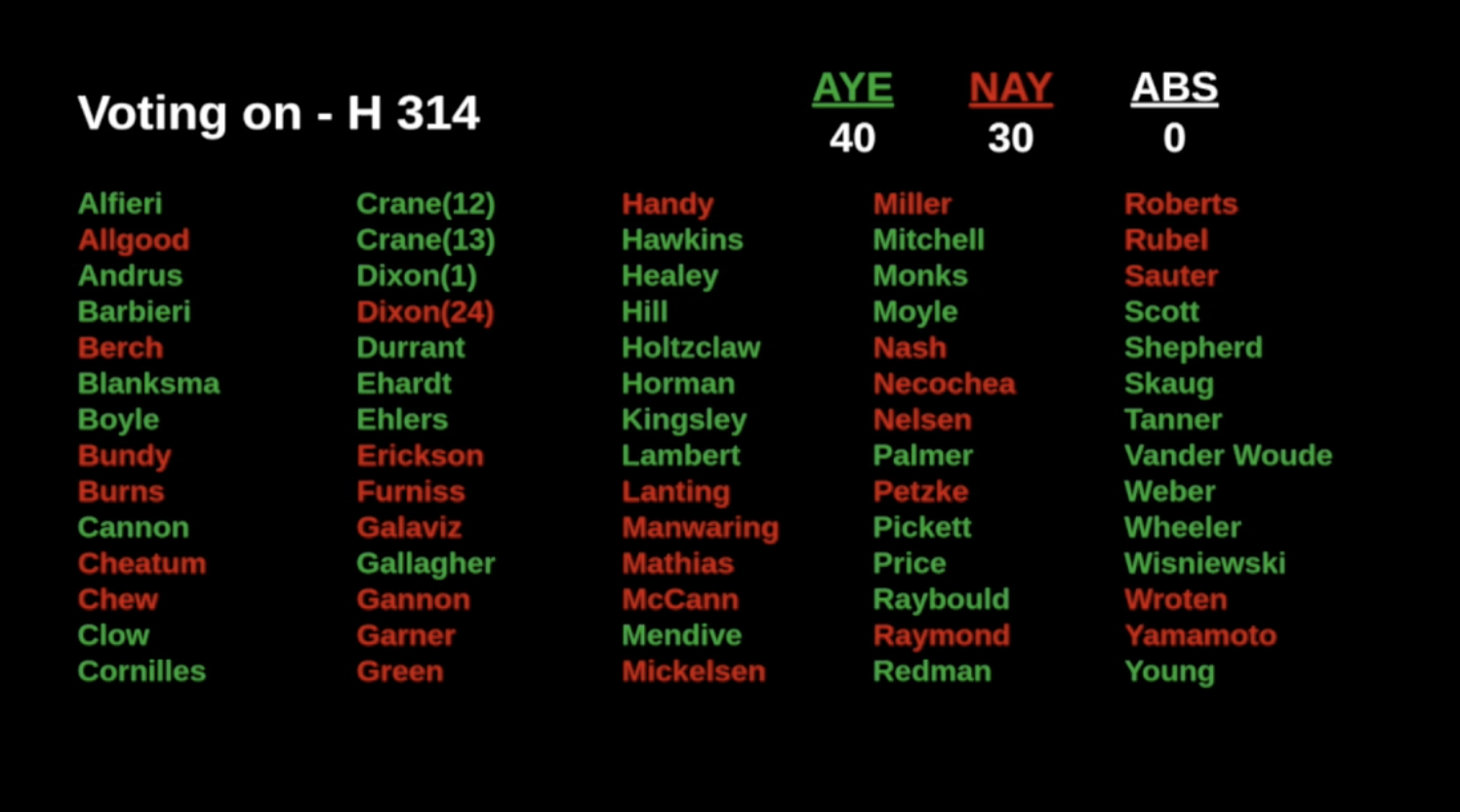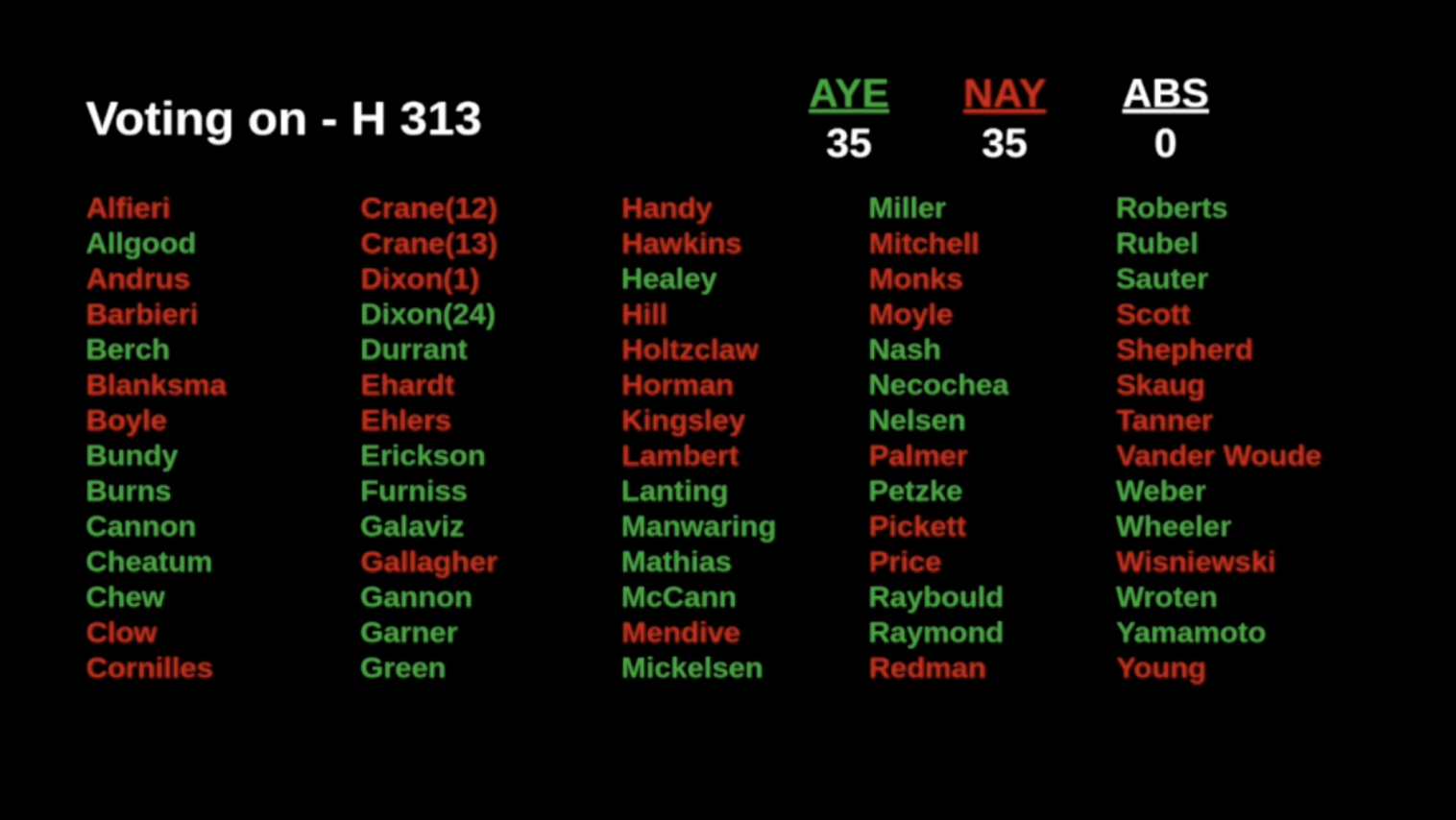A bill banning pornographic materials from public and school libraries is headed to the Senate.
After over two hours of debate on the House floor, the bill passed on a 40-30 vote.
House Bill 314 is the third library bill to surface this legislative session (two died in the House Education Committee in early March). The bill seeks to prohibit “harmful” or “obscene” materials from libraries. It also paves a path for aggrieved parents to sue a school or library district for up to $2,500 in damages.
The intent, according to bill co-sponsor Rep. Jaron Crane, R-Nampa, is to prevent minors from accessing pornographic content — something he, along with fellow sponsors Sen. Cindy Carlson, R-Riggins, and Blaine Conzatti of the Idaho Family Policy Center, argue is present in many local libraries.
But Monday’s debate on HB 314 revealed further division among House Republicans.
Rep. Joe Alfieri, R-Coeur d’Alene, said the questionable library materials he’s seen in his district are “pure smut.” Other North Idaho lawmakers agreed. Rep. Mike Kingsley, R-Lewiston, said library content can be used as a tool to sexually groom minors. “The pedophiles are hoping we don’t pass this bill,” Kingsley said.
But Rep. Lori McCann, also from Lewiston, came armed with testimonies from high school students in the Lewiston-Moscow area. HB 314, she said, would intimidate libraries into removing all materials with any sexual content at all, taking away age-appropriate reading opportunities away from high schoolers.
One student emailed McCann to say the Moscow Library saved their life — specifically, books about transgender youth. Since books about LGBTQ+ issues are some of the most targeted across the state, McCann urged the Legislature to think about HB 314’s ramifications.
And Rep. Greg Lanting, R-Twin Falls, wondered whether the targeted materials are pornographic at all. After checking out and reading some of the books in question, Lanting rated most of them PG. Others received higher maturity ratings, but for violence, not sexual content.
And the bill’s civil action clause caused many Republicans heartburn. Rep. Julie Yamamoto, R-Caldwell, said the bill would open up school districts to continual litigation, taking time and resources away from what really matters in education — the students.
After over two hours, the House put the bill to a vote. It passed 40-30, and will head to the Senate to be assigned a committee.

Feminine hygiene bill dies in split vote
An evenly split House rejected a bill that would put free feminine hygiene products in public secondary schools. The $730,000 bill died with a 35-35 vote.
House Bill 313 would have made pads and tampons available in middle and high school restrooms. The goal, according to bill co-sponsor Rep. Lori McCann, was to help female students escape period poverty — the inability to afford or access feminine hygiene products.
Without access to the products, female students will skip class or resort to unhygienic alternatives, McCann said. And because female menstruation still carries a stigma, McCann said, many students will avoid asking a nurse, teacher or administrator for help.
Rep. Rod Furniss, R-Rigby, co-sponsored the legislation. During his presentation Monday, Furniss said the bill is about protecting Idaho’s “greatest asset” — women.
Speaking from her experience as a pediatric nurse, Rep. Dori Healey said HB 313 is a “very inexpensive solution” to a problem that many young girls face.
“I know many men in here don’t understand this … you don’t understand what it’s like to have blood dripping down your pants,” Healey said.
And many male legislators spoke uncomfortably during Monday’s debate.
“I do not want to talk about this,” said Rep. Charlie Shepherd, R-Pollock.
Female lawmakers also expressed contempt for the legislation.
Rep. Heather Scott, R-Blanchard, said HB 313 is part of a nationwide liberal agenda — following suit of other states like California and New York. “You don’t have to be a woman to understand the absurdity of this bill,” Scott said.
And Rep. Julianne Young, R-Blackfoot, said HB 313 and Monday’s debate felt patronizing. The responsibility for feminine hygiene, said Young, should fall to a student’s parents. Without that oversight, the student could face health problems.
With a 35-35 vote, HB 313 died on the floor.

JFAC tweaks higher education building plan
Budget-writers took another look at university building projects Monday morning — and didn’t change the bottom line.
Higher education would still receive $72.9 million for new buildings. But the Joint Finance-Appropriations Committee voted to give the University of Idaho, Idaho State University and Lewis-Clark State College some additional spending flexibility. The three four-year schools would be able to mix and match, spending their money from a list of approved projects.
Here’s how the spending breaks down:
- Boise State University: $17.9 million for a science research building.
- College of Western Idaho: $15.7 million, for a student learning center and horticulture expansion.
- College of Southern Idaho: $11.5 million, for remodeling its Evergreen Building and emergency generator and data center improvements.
- U of I: $9 million.
- Idaho State: $8.4 million.
- College of Eastern Idaho: $8 million, for campus infrastructure improvements.
- Lewis-Clark: $2.4 million.
Supporters of the Permanent Building Fund budget say the money will partially fund projects across the campuses, with spending based roughly on enrollment.
Sen. Scott Herndon, R-Sagle, argued against partially funding projects, instead of fully funding some projects on the state’s list.
The Permanent Building Fund budget language passed on a 15-3 vote. The House and Senate still must approve this budget.
Private school tuition bill: an update
A bill to provide $12 million a year in private school tuition credits is headed to the House Education Committee after all.
On Monday, House Speaker Mike Moyle referred the controversial Senate Bill 1161 to House Education. On Friday, he had left the bill on hold, declining to send it to any committee.
On Friday, Moyle said he was holding the bill to allow its sponsors and House Education members to talk through their differences. But by holding the bill, Moyle had held open the option of diverting the bill to another committee.
Moyle’s move means House Education is poised to hold a hearing on another school choice bill, days after voting down a different proposal. SB 1161 would have to clear this committee in order to come to the House floor for a final vote.
An expansion of the state’s Empowering Parents education microgrant program, SB 1161 passed the Senate Thursday.
‘In God We Trust’ bill heads to governor
The Senate passed a bill mandating schools to accept posters or plaques bearing the motto “In God We Trust.”
Under House Bill 202, any public school, college or university would be required to display the donated plaques or posters.
“This is about an important piece of our national history,” said the bill’s Senate sponsor, Sen. Todd Lakey, R-Nampa.
Sen. Rick Just, D-Boise, said the bill essentially chooses winners and losers, by placing Christian faith ahead of all others. “Let’s keep a bright line between church and state.”
The bill passed on a 27-8 vote, and now goes to Gov. Brad Little’s desk.
Two bills advance out of House committee
The House Education Committee approved two bills Monday morning.
- CTE funding. A bill expanding the eligibility for career technical education centers/schools to access added-cost funding passed with a unanimous vote. It will head to the House floor for a final vote.
- Advisory question. A bill that would put a school choice advisory question (relating to education savings accounts and school voucher programs) on the November 2024 ballot made it out of committee. Three people testified — two in favor of the bill. The bill passed 10-6.
